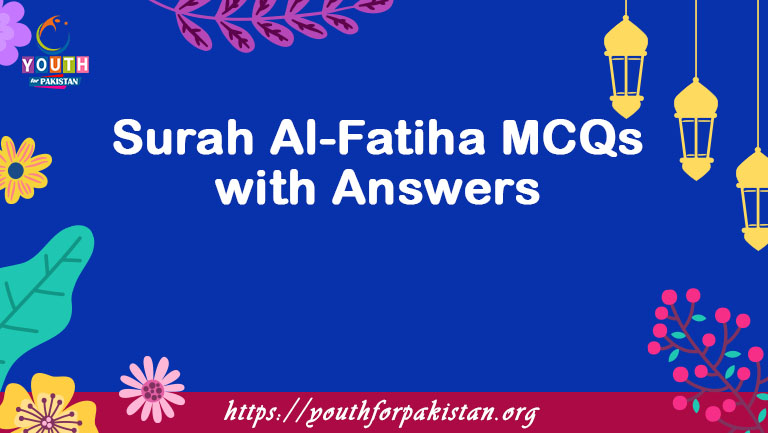The following are Surah Al-Fatiha MCQs with answers related to Islamic Studies. We have arranged the most important and repeated MCQs in all the competitive examinations. The students can clear their concepts for Surah Al-Fatiha MCQs online quiz by attempting these.
Surah Al-Fatiha Online MCQs with Answers
What is the literal meaning of “Al-Fatiha”?
a) The Opening
b) The Closing
c) The Middle
d) The Conclusion
How many verses are there in Surah Al-Fatiha?
a) 5
b) 6
c) 7
d) 8
Surah Al-Fatiha is also known as:
a) The Prayer
b) The Praise
c) The Key to the Prayer
d) The Reminder
Which Prophet is mentioned in Surah Al-Fatiha?
a) Prophet Moses (Musa)
b) Prophet Jesus (Isa)
c) Prophet Muhammad (S.A.W)
d) Prophet Abraham (Ibrahim)
What is the primary theme of Surah Al-Fatiha?
a) Mercy and Forgiveness
b) Guidance and Worship
c) Charity and Almsgiving
d) Family and Community
Surah Al-Fatiha is recited in which unit of the Islamic prayer (Salat)?
a) First Rak’ah (unit)
b) Second Rak’ah (unit)
c) Third Rak’ah (unit)
d) Fourth Rak’ah (unit)
Which of the following is NOT one of the names of Surah Al-Fatiha?
a) Al-Hamd
b) Al-Kitab
c) Al-Shifa
d) Al-Tafsir
What is the central focus of Surah Al-Fatiha?
a) The Day of Judgment
b) Seeking Guidance
c) Repentance and Forgiveness
d) Belief in Angels
Surah Al-Fatiha is recited in which daily prayer?
a) Fajr (Dawn)
b) Maghrib (Evening)
c) Asr (Afternoon)
d) Isha (Night)
What is the first verse of Surah Al-Fatiha?
a) “In the name of Allah, the Most Gracious, the Most Merciful.”
b) “All praise is due to Allah, the Lord of all the worlds.”
c) “You alone we worship, and You alone we ask for help.”
d) “Guide us on the Straight Path.”
What does “Rabb” refer to in the phrase “Rabb al-‘alamin” in Surah Al-Fatiha?
a) The Lord of the Day of Judgment
b) The Lord of all the worlds
c) The Most Gracious
d) The Most Merciful
Which attribute of Allah is emphasized in the phrase “Ar-Rahman Ar-Raheem” in Surah Al-Fatiha?
a) The All-Knowing
b) The Most Forgiving
c) The Most Merciful
d) The All-Powerful
Surah Al-Fatiha is also referred to as the “Seven Oft-Repeated Verses.” What is the significance of this name?
a) It is recited seven times in daily prayers.
b) It is recited in seven different languages.
c) It is recited seven times during Hajj.
d) It is a reference to its importance and frequency of recitation.
What does “Iyyaka na’budu wa iyyaka nasta’in” mean in English?
a) “You alone we worship, and You alone we ask for help.”
b) “In the name of Allah, the Most Gracious, the Most Merciful.”
c) “All praise is due to Allah, the Lord of all the worlds.”
d) “Guide us on the Straight Path.”
In Surah Al-Fatiha, what is the “Straight Path” that Muslims ask to be guided on?
a) The path to worldly success
b) The path to financial prosperity
c) The path of the righteous and obedient to God
d) The path of personal happiness
How many times is the phrase “Alhamdulillahi Rabbil ‘alamin” repeated in Surah Al-Fatiha?
a) Once
b) Twice
c) Three times
d) Four times
The phrase “Maliki yawm ad-din” in Surah Al-Fatiha refers to:
a) The Owner of the Day of Judgment
b) The Provider of daily sustenance
c) The One who guides us
d) The Merciful and Compassionate
What is the final verse of Surah Al-Fatiha?
a) “In the name of Allah, the Most Gracious, the Most Merciful.”
b) “All praise is due to Allah, the Lord of all the worlds.”
c) “Guide us on the Straight Path.”
d) “Ameen.”
Which of the following is NOT one of the attributes of Allah mentioned in Surah Al-Fatiha?
a) The Most Gracious
b) The Most Merciful
c) The All-Knowing
d) The All-Powerful
The phrase “Ihdina as-sirat al-mustaqim” translates to:
a) “In the name of Allah, the Most Gracious, the Most Merciful.”
b) “All praise is due to Allah, the Lord of all the worlds.”
c) “Guide us on the Straight Path.”
d) “The Owner of the Day of Judgment.”
In Surah Al-Fatiha, what is the purpose of seeking guidance on the Straight Path?
a) To achieve material wealth
b) To attain worldly success
c) To worship Allah and lead a righteous life
d) To gain political power
Which of the following phrases signifies the end of Surah Al-Fatiha?
a) “In the name of Allah, the Most Gracious, the Most Merciful.”
b) “All praise is due to Allah, the Lord of all the worlds.”
c) “Guide us on the Straight Path.”
d) “Ameen.”
Surah Al-Fatiha is recited during which specific moment in the Islamic prayer?
a) At the beginning of the prayer
b) In the middle of the prayer
c) At the end of the prayer
d) Throughout the prayer
What does “Ihdina as-sirat al-mustaqim” mean?
a) “In the name of Allah, the Most Gracious, the Most Merciful.”
b) “All praise is due to Allah, the Lord of all the worlds.”
c) “Guide us on the Straight Path.”
d) “The Owner of the Day of Judgment.”
Surah Al-Fatiha is often referred to as the “Essence of the Quran” because:
a) It summarizes the entire Quran.
b) It is the longest chapter in the Quran.
c) It contains stories of all the prophets.
d) It is only recited during special occasions.
The phrase “Ghayr al-maghdubi ‘alayhim wa la-dallin” in Surah Al-Fatiha refers to:
a) Those who have earned Allah’s wrath
b) Those who are misguided
c) Those who are disbelievers
d) Those who are righteous
In Surah Al-Fatiha, who are the “Maghdubi ‘alayhim”?
a) The disbelievers
b) The hypocrites
c) Those who have earned Allah’s wrath
d) The righteous
The phrase “Siraat al-ladhina an’amta ‘alayhim” in Surah Al-Fatiha refers to:
a) The path of the righteous
b) The path of the disbelievers
c) The path of those who are misguided
d) The path of the prophets
What is the significance of reciting Surah Al-Fatiha in the Islamic prayer?
a) It is obligatory for the validity of the prayer.
b) It is optional and can be skipped if desired.
c) It is only recited during special prayers.
d) It is recited silently by the imam only.
What is the primary message conveyed by Surah Al-Fatiha?
a) The importance of charity and almsgiving
b) The need for religious rituals
c) The concept of monotheism and seeking Allah’s guidance
d) The history of the prophets
Surah Al-Fatiha is recited in every unit of which daily prayer?
a) Fajr (Dawn)
b) Dhuhr (Noon)
c) Maghrib (Evening)
d) Isha (Night)
What is the primary purpose of reciting Surah Al-Fatiha in prayer?
a) To praise Allah
b) To seek forgiveness
c) To seek guidance
d) To ask for worldly blessings
The phrase “Ameen” is recited by:
a) The imam only
b) The congregation only
c) Both the imam and the congregation
d) It is not recited in the prayer
What is the English translation of “Ameen”?
a) Peace
b) Praise be to Allah
c) So be it
d) Allah is great
What does “Rabb al-‘alamin” mean in English?
a) The Lord of all the worlds
b) The Lord of the Day of Judgment
c) The Most Gracious
d) The Most Merciful
The phrase “Iyyaka na’budu” means:
a) “You alone we worship.”
b) “In the name of Allah, the Most Gracious, the Most Merciful.”
c) “Guide us on the Straight Path.”
d) “The Owner of the Day of Judgment.”
In Surah Al-Fatiha, what is the significance of praising Allah as “Rabb” (the Lord)?
a) It emphasizes Allah’s power and authority over all creation.
b) It signifies Allah’s role as the Most Merciful.
c) It highlights Allah’s knowledge of the unseen.
d) It indicates Allah’s willingness to forgive.
What is the primary message of the phrase “Maliki yawm ad-din” in Surah Al-Fatiha?
a) The importance of daily prayers
b) The concept of accountability on the Day of Judgment
c) The need for charity and almsgiving
d) The role of prophets in guiding humanity
In Surah Al-Fatiha, what is the significance of seeking Allah’s guidance?
a) It is a request for material wealth and success.
b) It reflects the desire for personal happiness.
c) It emphasizes the importance of following the right path.
d) It signifies the need for political power.
Which of the following is a common misconception about Surah Al-Fatiha?
a) It is the longest chapter in the Quran.
b) It is recited only during special occasions.
c) It is recited silently in prayer.
d) It is the opening chapter of the Quran.
What is the significance of beginning Surah Al-Fatiha with “Bismillahir-Rahmanir-Raheem”?
a) It is a request for guidance.
b) It is a declaration of faith.
c) It invokes the name of Allah, the Most Merciful.
d) It is a statement of gratitude.
What does “Ghayr al-maghdubi ‘alayhim” mean in English?
a) “Those who have earned Allah’s wrath.”
b) “In the name of Allah, the Most Gracious, the Most Merciful.”
c) “All praise is due to Allah, the Lord of all the worlds.”
d) “Guide us on the Straight Path.”
In Surah Al-Fatiha, what is the central theme of the phrase “Ihdina as-sirat al-mustaqim”?
a) The importance of charity
b) The concept of accountability
c) The need for guidance on the right path
d) The role of prophets in history
The phrase “Siraat al-ladhina an’amta ‘alayhim” in Surah Al-Fatiha is a reference to:
a) The path of the disbelievers
b) The path of the righteous
c) The path of the hypocrites
d) The path of the angels
What is the primary message conveyed by the phrase “Iyyaka na’budu wa iyyaka nasta’in” in Surah Al-Fatiha?
a) The importance of daily rituals
b) The need for personal happiness
c) The concept of monotheism and reliance on Allah
d) The history of the prophets
In Surah Al-Fatiha, what is the significance of acknowledging Allah as “Rabb” (the Lord)?
a) It signifies Allah’s role as the Most Gracious.
b) It highlights Allah’s knowledge of the unseen.
c) It emphasizes Allah’s power and authority over all creation.
d) It indicates Allah’s willingness to forgive.
What is the purpose of reciting Surah Al-Fatiha in the Islamic prayer?
a) To praise Allah’s creation
b) To seek material wealth
c) To seek Allah’s guidance and mercy
d) To recount the history of the prophets
What is the role of the phrase “Maliki yawm ad-din” in Surah Al-Fatiha?
a) To emphasize the importance of daily prayers
b) To remind believers of the Day of Judgment
c) To praise Allah for His guidance
d) To seek forgiveness for sins
What is the significance of ending Surah Al-Fatiha with the word “Ameen”?
a) It signifies the completion of the prayer.
b) It is a request for Allah’s mercy.
c) It is a declaration of faith.
d) It is an expression of agreement with the prayer.
In Surah Al-Fatiha, what is the central message conveyed by “Iyyaka na’budu wa iyyaka nasta’in”?
a) The importance of charity and almsgiving
b) The need for personal happiness and success
c) The concept of monotheism and reliance on Allah
d) The history of the prophets










